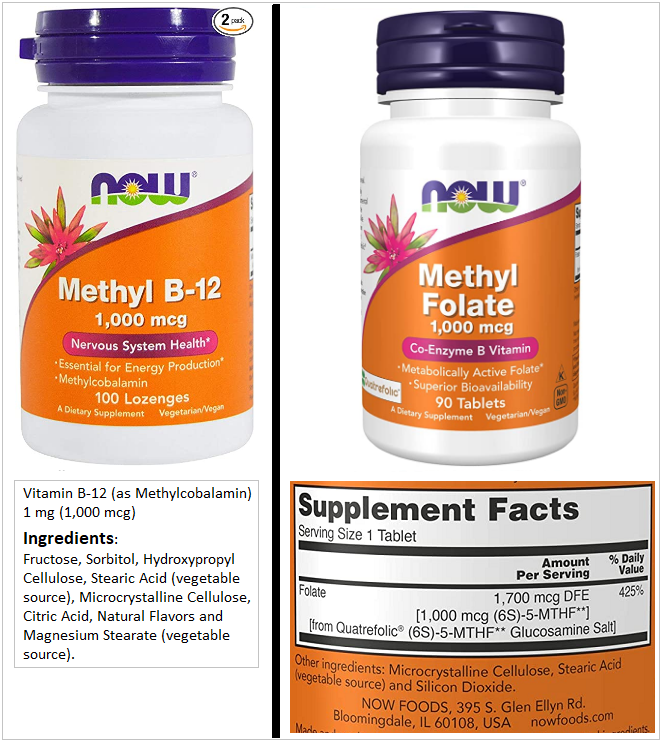Vitamin B-12 & Folate
People on plant-based, vegetarian, or vegan diet often use vitamin B-12 (cobalamin) because plants and fruits don’t contain vitamin B-12. That’s why their healthcare provider encourage them to using vitamin B-12 supplements.
Why Do We Need Vitamin B-12 & Folate?
Our body needs Vitamin B-12 to function normally. It’s helpful in making red blood cells. It also aids our nervous system, cell metabolism, and production of DNA.
Folate also helps your body make red blood cells. In addition, it plays an important part in repairing cells and production of DNA. So, you can see how vitamin B-12 and folate offer some of the same benefits. That’s why if you are checking your vitamin B-12, it may be a good idea to also check your folate level, especially if you follow a plant-based diet.
According to the University of Rochester Medical Center, “If you don’t have enough red blood cells, you have anemia. Red blood cells carry oxygen to all parts of your body. When you have anemia, your blood can’t bring enough oxygen to all your tissues and organs. Without enough oxygen, your body can’t work as well as it should.”
Because both vitamin B-12 and folate help make red blood cells. Lack of vitamin B-12 can also cause anemia and other problems listed later on this page.
Vitamin B-12 & Folate Food Sources
Most people get enough vitamin B-12 from meat, fish, poultry, eggs, dairy, and foods fortified with vitamin B-12, such as cereals. People on plant-based, vegetarian, or vegan diet can get vitamin B-12 from oral supplements.
According to University of Rochester Medical Center, folate is found naturally in:
- Leafy green vegetables, such as spinach, kale, collards, and romaine lettuce
- Citrus fruits and juices
- Dried beans, lentils, and peas
- Yeast
- Liver
- Asparagus
- Broccoli
- Wheat germ
The synthetic form of folate, called folic acid (vitamin B-9), can be found in certain:
- Cereals
- Breads
- Grains
Folate is usually not a problem for people who eat vegetables, fruits, beans, and grains. However, it’s a good idea to have your folate level checked with a blood test just to make sure you don’t have folate-deficiency. If you have a folate deficiency, you can get folate from oral supplements.
Vitamin B-12 & Folate Deficiency
There are many reasons for vitamin B-12 deficiency. A few of them are listed below.
- Not enough meat, fish, poultry, eggs, and dairy in the diet.
- Drugs that interfere with vitamin B-12 absorption, such as:
- Vitamin C (ascorbic acid) supplements.
- Acid reflux medications called proton pump inhibitors (PPI), such as Prilosec, Prevacid, etc.
- Diabetes drug called Metformin (Glumetza, Fortamet, etc.).
- Aminosalicylic acid (Paser) used to treat digestive problems.
- Anti-inflammatory drug for gout called Colchicine (Colcrys, Mitigare, Gloperba).
- Age. Older adults tend to be more prone to low levels of vitamin B-12.
- People who are unable to absorb vitamin B-12 due to certain conditions.
It’s important to understand that lack of vitamin B-12 can cause significant harm to your body. According to the world-famous Mayo Clinic, “Research on the use of vitamin B-12 for specific activities and conditions shows:
- Heart and blood vessel disease. Researchers had previously believed that vitamin B-12, when combined with folic acid (vitamin B-9) and vitamin B-6, might prevent diseases of the heart and blood vessels by reducing the levels of an amino acid in the blood (homocysteine). However, studies show that the combination of these vitamins doesn’t seem to reduce the risk or severity of cardiovascular disease and stroke.
- Dementia. Vitamin B-12 deficiency is associated with dementia and low cognitive function, but it’s not clear whether vitamin B-12 supplements might help prevent or treat dementia.
- Athletic performance. Unless you have a vitamin B-12 deficiency, there’s no evidence that vitamin B-12 supplements will boost your energy or make you a better athlete.”
Vitamin B-12 deficiency can cause the following:
- Anemia
- Problems with nervous system
- Fatigue
- Intestinal issues
- Problems with brain function
- Muscle weakness
- Nerve damage
- Mood disturbances
Folate deficiency can be due to the following:
- Drinking too much alcohol.
- Unable to absorb folic acid.
- Pregnancy.
- Not eating a healthy diet.
- Taking certain medicines (e.g., those used to control seizures).
| CAUTION! Always talk to your healthcare provider before getting on any supplements, over-the-counter medications, or making other significant changes to your diet, like switching to a vegetarian diet, trying different cleanses, etc. |
Difference Between Vitamin B-12 & Methyl B-12
Vitamin B12 supplements are typically derived from two sources: Cyanocobalamin or Methylcobalamin.
- Cyanocobalamin is a synthetic (man-made) form of vitamin B12 found only in supplements.
- Methylcobalamin is a naturally occurring form of Vitamin B-12 that you can get through either food sources or supplements.
Your doctor may tell you to use Methyl B-12, which is vitamin B-12 in its naturally occurring form. For folic acid, the doctor may recommend Methyl Folate, which is folic acid in its naturally occurring form.
| TIP: If the bottle says cobalamin, it contains the synthetic vitamin B-12, if it says Methylcobalamin, it contains the naturally occurring form of vitamin B-12. |
NOW is a popular brand that can be purchased, among other places, at Amazon.com. The screenshot below lists the contents so you can compare them with products from other vendors.

References used in this article:
